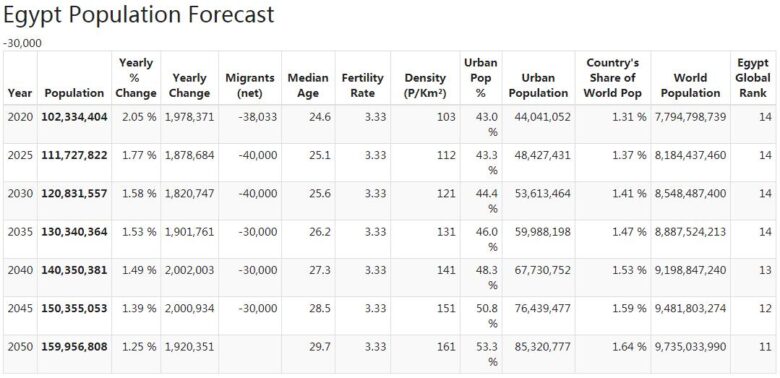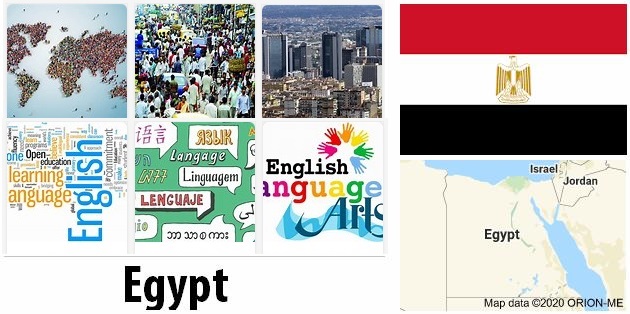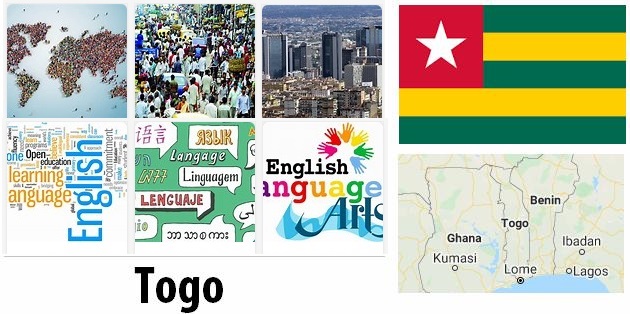Egypt Population and Language
Egypt is the most populous country in the Middle East and has Africa’s third largest population (after Nigeria and Ethiopia). The population is highly concentrated to a small area; The Nile Valley and the river delta are among the most densely populated areas in the world. The vast majority are Arabs, and Arabic is the official language.
There is also a population concentration on the Suez Canal. The inhabited areas and all cultivated area together constitute less than five percent of the land area. The population concentration means that the country’s 100 million residents are crowded on a surface roughly equivalent to Denmark. Cairo with suburbs is a giant megapolis with over 20 million residents. The overpopulation has meant that new cities are planned in the deserts. The previously high Population growth has been suppressed, but the population is still young. Every third resident is under 15 years. 60 percent are under 30.
- COUNTRYAAH.COM: Key populations estimated size and data of Egypt, including population density of how many people per square mile. Also included are facts for population and language.
A few percent of the population belong to minorities such as Nubians, Armenians, Greeks and Berbers and others.
The Christian Copts (see Religion) see themselves as descendants of ancient Egyptians, even though they are Arab influenced. Their language of worship derives from ancient Egyptian.
The Nubians, who hail from southern Egypt, have in recent years sought to gain recognition for their language, which consists of two main dialects: kenzi and fadiji. The Nubians themselves expect to be several millions in number. Many were forced to relocate when the Assuan Dam was built and their traditional lands flooded. Their language has not been taught in the school system, but there are stories that the Nubian was used as a military code language by Egyptians during the war against Israel in 1973.
All native Egyptians speak Arabic, which is the country’s primary school language. Egyptian dialects are understood by most people in the Arab world as a result of Egypt’s dominance in mass media and culture. The spoken Arabic varies widely, while modern standard Arabic (both written and spoken language) is essentially the same in all Arab countries. A distinctive feature of Egyptian dialect is that the everyday language contains a lot of Italian and Turkish loan words. Well-educated Egyptians often speak French or English as well.
FACTS – POPULATION AND LANGUAGE
Population
100 000 000 (2020) 1
Number of residents
97 553 151 (2017)
Number of residents per square kilometer
98 (2017)
Percentage of residents in the cities
42.7 percent (2017)
Nativity/birth
26.5 per 1000 residents (2016)
Mortality/mortality
5.9 per 1000 residents (2016)
Population growth
1.9 percent (2017)
Fertility rate
3.3 number of births per woman (2016)
Percentage of women
49.4 percent (2017)
Life expectancy
71 years (2016)
Life expectancy for women
74 years (2016)
Life expectancy for men
69 years (2016)
Language
Arabic is the official language
- According to State StatisticsSources
2015
December
The parliamentary election ends
1 December
The last round of elections will be held December 1-2. A few days later it is reported that all 120 seats added from party lists went to For Egypt’s sake, an alliance of Sisitrogen alliances and groups. The 448 seats that are weighted for individual individuals go partly to independent candidates and partly to candidates with links to different parties. Overall, the new parliament is expected with 596 members clearly loyal to Sisi (see further Political system). The turnout in the parliamentary elections was 28 percent, according to the election committee.
16 dead in fire bomb attacks
Restaurant in the central parts of Cairo. The Ministry of the Interior reports that the attack on a restaurant in central Cairo was an internal riot and not a terrorist act.
November
Attacks on hotels in Sinai
Four people are killed in an attack on a Sinai hotel. Three perpetrators also die, two of them suicide bombers. There were several judges in the hotel who were present to monitor the ongoing parliamentary elections. One of the victims was a judge.
Traces of explosives found in the wreckage
Almost three weeks after the plane crash, the Russian security service FSB states that it was caused by a terrorist attack.
Russia stops travel
After a few days, Russia decides to fly home the approximately 80,000 Russian tourists in Egypt. Egypt maintains that the suspicion that an explosive charge was on is pure speculation. The IS-affiliated Sinai Province reiterates its claim that the group was behind the explosion.
Tourist journeys are stopped after the plane crash
Several countries cancel flights to Sharm el-Sheikh, pick up tourists in advance and warn people from traveling you.
October
Russian passenger plane crashes
October 31st
All 224 people on board die when the plane crashes in North Sinai on October 31. The plane was on its way from the tourist resort of Sharm el-Sheikh to Saint Petersburg. IS claims to have caused the crash.
The parliamentary elections begin
October 18
The first round of the parliamentary elections will be held October 18-19. The turnout is just over 25 percent, states the electoral authority.
September
Tunnels to Gaza are water filled
The army starts pumping water from the Mediterranean into the long tunnels under the border of the Gaza Strip, which has long been used for smuggling goods. Egypt has been working since 2013 to create a buffer zone nearly one kilometer from the border and demolished virtually all buildings .
The government is leaving
No official reason is stated but a few days earlier the Minister of Agriculture has resigned and been arrested on suspicion of corruption, and there are indications that corruption suspicions mean that Prime Minister Ibrahim Mahlab and the entire government may also go. Oil Minister Sharif Ismail gets commissioned to form new government.
August
Dates ready for parliamentary elections
The elections are held partly at different times in different parts of the country and partly in two rounds of elections. The election begins in mid-October and runs until the beginning of December.
Sharpened anti-terror laws
President Sisi, who promised tougher hold after the June assassination of the state prosecutor, refers to the growing Islamist insurgency. Critics fear that the laws will also be applied to peaceful opponents. Amnesty International says that the change in the law means that freedom of expression and assembly are practically scrapped in Egypt .
July
Military attack against Islamists
A few days after the coordinated Islamist attacks, the military reports that 63 Islamists have been killed in the attack against four hiding places, between Shaykh Zuwayd and Rafah near the Gaza Strip border.
Islamist attacks on Sinai Peninsula
The army reports that over 100 have been killed, including 17 soldiers, in connection with attacks against military posts. It is said to be one of the major coordinated attacks by the IS-linked Sinai province.
June
Over 41,000 arrested in two years
Amnesty International states in a report that repression is all-encompassing in Egypt two years after the military takeover. “Mass protests have been replaced by mass arrests,” writes Amnesty. More than 41,000 have been arrested and prosecuted, or sentenced after unsuccessful trials, it says.
The prosecutor is killed in the explosion
State Prosecutor Hisham Barakat dies and several are injured in an attack on the car column he is traveling in. He is the highest ranking person so far killed since Sisi took office. Thousands of Islamists have been arrested under Barakat’s leadership and many have been sentenced to death or long prison sentences.
March
Egypt participates in attack against Yemen
An alliance led by Saudi Arabia launches air strikes against the Shiite Muslim Huthi rebels in Yemen, which advanced during the year and captured the capital, among other things, and pushed President Abd Rabbu Mansur Hadi from power .
New capital is planned
The government presents plans to build a new city in the desert, nearly five miles east of Cairo and halfway to the port city of Suez. The city will have up to five million residents and the government buildings are expected to be moved there between 2020 and 2022.
February
New anti-terrorist law is adopted
The authorities now have the right to intervene against individuals or groups that “damage the unity of the nation” or “disrupt the general order” – formulations that appear to be directed at protest statements.
Bloggers are sentenced to five years in prison
Bloggers Alaa Abdel Fattah is convicted of violating the anti-protest laws (see November 2013). It is the second trial to be held, in June 2014 he was sentenced to 15 years in prison but that sentence was revoked.
Egyptian air strike against IS in Libya
The attack is carried out since 21 Coptic guest workers in Libya were murdered by IS. A video has been published showing how the men were beheaded on a beach. IS states their Christian faith as reason. Seven days of national grief are announced in Egypt.
Football violence demands life
At least 22 people die when violence erupts in the stands during a football match in Cairo. Reportedly, people are trampled to death when police use tear gas. Afterwards, all league matches are set indefinitely (compare February 2012).
New convictions against activists
Ahmed Douma (see December 2013) and 229 others are sentenced to life imprisonment for participating in riots, rioting for violence and attacks against security forces. Douma is also sentenced to pay $ 2.2 million in fines for burning a building.
January
New attack on military in Sinai
At least 26 people, the majority of soldiers, are killed in coordinated attacks on the Sinai Peninsula. The Islamist group that assumed responsibility was formerly called Ansar Bayt al-Maqdis but now calls itself the Sinai Province, after swearing the Islamic State (IS) allegiance.
Worried about Revolution Day
At least 20 people were killed around the country in connection with the four-year anniversary of the uprising that led to Mubarak’s fall. Several dozens are also injured in clashes between protesters and police. Over 500 arrests, of which nearly 100 are requested to be arrested.




